Central Intelligence Agency
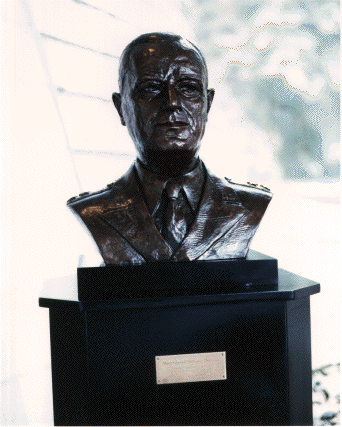 Never have so many done so much that was so bad to so many others for so little discernible benefit to so few.
Never have so many done so much that was so bad to so many others for so little discernible benefit to so few.
Spies have been with us always, but the Central Intelligence Agency is purely a 20th century phenomenon. While intelligence agencies like the KGB and Israel's Mossad have often employed appalling tactics to further their goals, the CIA has earned itself a special distinction for using most of the same appalling tactics much less effectively.
Prior to World War II, U.S. intelligence operations were informally conducted under the auspices of various military and law enforcement agencies. In 1941, the Japanese "surprise" attack on Pearl Harbor highlighted an apparent flaw in this system — namely that U.S. intelligence sucked.
There is a perennially recurring story that President Franklin D. Roosevelt had advance warning of the attack but allowed it to proceed in order to galvanize the American people into a war frenzy. Regardless of the veracity of this allegation, the perceived failure at Pearl Harbor provided the pretext for a new consolidation of intelligence power in Washington.
In 1942, FDR ordered the formation of the Office of Strategic Services. The OSS served as a clearinghouse for intelligence reporting, but it wasn't empowered (officially) to take charge of the various spy shops scattered across the U.S. executive branch.
Toward the end of the war, General William Donovan began floating a proposal to create a super-powerful centralized agency answerable only to the president, which would coordinate intelligence gathering, determine national security objectives and execute "subversive operations" to accomplish said objectives.
In 1947, the CIA was officially born (about a year after it had already effectively started operations), under the auspices of President Harry Truman and the National Security Act. In 1948, its charter was expanded to include "covert actions" in addition to intelligence-gathering. In 1949, the Central Intelligence Act broadened the scope of the CIA's powers and eliminated most oversight and accountability.
Under its charter, the CIA was expressly forbidden from conducting domestic operations — within the context of the aforementioned absence of oversight and accountability.
In the absence of a major international conflict, the CIA floundered aimlessly for its first few years of existence. The onset of the Korean War in the 1950s helped bring the organization into sharper focus. In 1953, Allen Dulles took over as director, and the agency began to morph into the feared-yet-seemingly-ineffectual behemoth it is today.
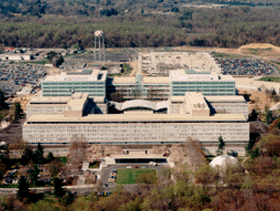 The looming threat of Communism fueled huge increases in CIA staff and budget through out the next two decades. The mission and ambition of the CIA also grew during this period. Intelligence-gathering is all well and good, but it lacks the joie de vivre of a needlessly elaborate covert action to accomplish a morally ambiguous goal. Under Dulles, and continuing through the present day, the CIA took on the jobs nobody else could... or would... or should...
The looming threat of Communism fueled huge increases in CIA staff and budget through out the next two decades. The mission and ambition of the CIA also grew during this period. Intelligence-gathering is all well and good, but it lacks the joie de vivre of a needlessly elaborate covert action to accomplish a morally ambiguous goal. Under Dulles, and continuing through the present day, the CIA took on the jobs nobody else could... or would... or should...
The Columbia Encyclopedia entry for the agency unintentionally points out the major problem with the CIA's execution of its mission: "While covert operations receive the most attention, the CIA’s major responsibility is intelligence." Covert operations receive the most attention? Hmmm...
The directive empowering the CIA's activist role defines covert actions as activities "conducted or sponsored by this Government against hostile foreign states or groups or in support of friendly foreign states or groups but which are so planned and executed that any US Government responsibility for them is not evident to unauthorized persons and that if uncovered the US Government can plausibly disclaim any responsibility for them."
Among a few of the more colorful highlights of this "plausibly disclaimed" activity:
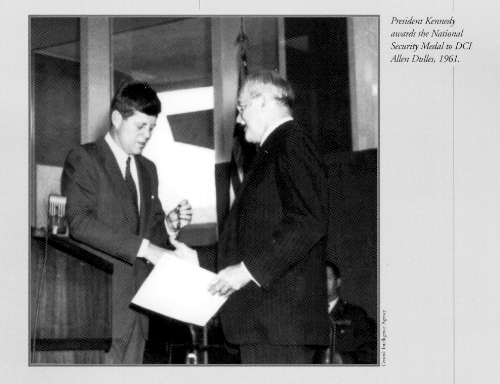
- Cuba: Two words: Exploding cigar. The history of the CIA and Cuba is storied and well-known, involving repeated attempts to assassinate Fidel Castro and the Bay of Pigs fiasco, in which the agency guided John F. Kennedy to a spectacularly failed attempt to overthrow the Castro regime. In the latter case, the CIA's post-mortem on the incident identified such strategic failures as neglecting "to advise the president, at an appropriate time, that success had become dubious and to recommend that the operation be therefore canceled" and failing to recognize that covert operation "had become overt."
- In the 1950s, the CIA began experimenting with mind-control as part of an infamous program known as MK Ultra. The agency shredded all its documentation on the program in the 1970s, but several details have been leaked and subsequently proven. In the 1950s, the agency discovered LSD. Its chief scientist, Sidney Gottlieb, experimented with the drug extensively — on himself and others. According to the New York Times, "the agency conducted 149 separate mind-control experiments, and as many as 25 involved unwitting subjects. First-hand testimony, fragmentary Government documents and court records show that at least one participant died, others went mad, and still others suffered psychological damage after participating in the project, known as MK Ultra. The experiments were useless, Gottlieb concluded in 1972, shortly before he retired." One of the most notorious MK Ultra projects involved using San Francisco hookers to dose unsuspecting clients and filming the results.
- In the late 1950s, the agency trained assassins to kill a CIA-drafted list of political officials to advance a coup in Guatemala. The successful coup overthrew the democratically elected president in favor of a procession of fascist dictators who ruled the country through military force and brutal suppression for the next four decades.
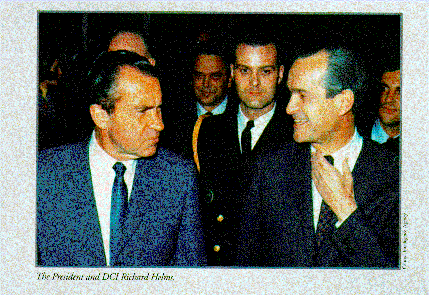
- The CIA spent 20 years or so sponsoring violent coups to eradicate popular leftist movements in Laos, only to meet with continual failure. Finally, after it became clear things just weren't working out, the military flew into Laos and bombed the country back into the stone age during the Vietnam War. Laos pretty much remains in the Stone Age today.
- In the early 1970s, Richard M. Nixon recruited "former" CIA officials (including E. Howard Hunt and G. Gordon Liddy) to work as part of the Plumbers, a group of vigilante operatives charged with stopping leaks and spying on behalf of the president's re-election efforts. Nixon would eventually fire Richard Helms, then CIA director, when Helms refused to concoct lies about national security in order to stop the FBI's investigation of Watergate.
- In 1953, despite a series of gaffes, the CIA succeeded in installing the Shah of Iran, a more or less fascist dictator whose oppressive looting of the nation benefited the U.S. for a couple decades, but ultimately bred the Islamic revolution that brought the Ayatollah Khomeini to power in the 1970s (a revolution which caught the CIA completely by surprise).
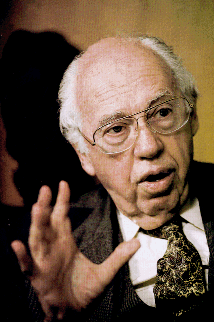 Iran was representative of the CIA's seeming inability to comprehend the Islamic and Middle Eastern mindsets, resulting in countless examples of "blowback," the agency's term for covert operations in which U.S.-supported operatives subsequently turn against their sponsors.
Iran was representative of the CIA's seeming inability to comprehend the Islamic and Middle Eastern mindsets, resulting in countless examples of "blowback," the agency's term for covert operations in which U.S.-supported operatives subsequently turn against their sponsors.
Other boners regarding Iran included the infamous Iran-Contra scandal of the 1980s, which made Oliver North a household name. Talk about your blowback... The CIA's role in the scandal was never proven, and only a single CIA official was ever indicted in the probe. Then-CIA director William Casey, renowned as one of the spookiest of all spooks, was strongly suspected of having a role in the affair, but he took his secrets to his deathbed (except for a controversial last-minute confession of evilness to which Bob Woodward claims to have been the sole witness).
The CIA's extreme inability to comprehend the consequences of personalities and religion in the Middle East was put on dismal display by two historically disastrous alliances, both formed in the name of fighting communism, which would very publicly highlight two of the CIA's most lavishly funded employees — Osama bin Laden and Saddam Hussein.
Bin Laden was a member of a small army of Islamic Jihadists fighting the Soviet Union in Afghanistan during the 1980s. The strategic minds of the CIA decided that this whole jihad thing looked like a great idea, and provided funding and weaponry to the mujahideen fighters, hoping to enflame the global Muslim community into jihad against the Soviets. The success of that strategy speaks for itself.
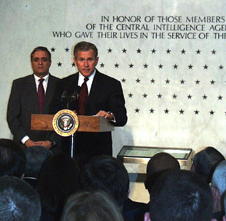 Around the same time, Iraq launched a war against neighboring Iran, which was itself a CIA-created disaster. At the time, Iran was stridently anti-American and loosely aligned with the Soviets. The U.S. government operated through both overt and covert channels to provide massive assistance to Hussein's war, including money and conventional weapons. The CIA also facilitated the transfer of supplies and technology for the construction of Biological Weapons, Nerve Agents and other Weapons of Mass Destruction for Iraqi use. Some of these weapons may have been employed against U.S. troops during the first Gulf War (which was conducted by George Bush Sr., himself a onetime director of the CIA), and they provided George Bush Jr. with a pretext for the second Gulf War (which ran along the lines of "How dare they stockpile these awful weapons we gave them?").
Around the same time, Iraq launched a war against neighboring Iran, which was itself a CIA-created disaster. At the time, Iran was stridently anti-American and loosely aligned with the Soviets. The U.S. government operated through both overt and covert channels to provide massive assistance to Hussein's war, including money and conventional weapons. The CIA also facilitated the transfer of supplies and technology for the construction of Biological Weapons, Nerve Agents and other Weapons of Mass Destruction for Iraqi use. Some of these weapons may have been employed against U.S. troops during the first Gulf War (which was conducted by George Bush Sr., himself a onetime director of the CIA), and they provided George Bush Jr. with a pretext for the second Gulf War (which ran along the lines of "How dare they stockpile these awful weapons we gave them?").
Not content with merely creating foreign policy disasters, the CIA also failed to anticipate the September 11 attacks on the World Trade Center and the Pentagon, working in close concert with the FBI to aggressively ignore vital intelligence already in its possession.
Of course, all of the above are merely the indisputably proven gaffes of the CIA. In addition to these known disasters, which are all true despite how ludicrous they might sound, there's a whole slew of suspected disasters which the Agency has not (yet) admitted to. These include:
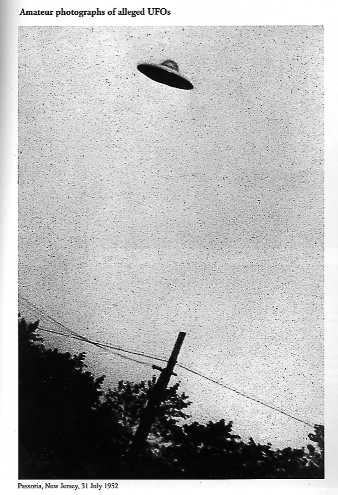
Based on what we know about the CIA's activities, most or all of the above claims could quite possibly be true. Sadly, the most compelling argument against most of these claims is Fidel Castro's longevity — evidence which seems to suggest that the CIA just isn't that good at assassinations.
In the aftermath of September 11, a great deal of intelligence authority has now been vested in the Department of Homeland Security. It's unclear how much of a change this actually entails for the Agency, but odds are it's somewhere between "not much" and "none at all."
Despite massive amounts of refreshed public scrutiny, new presidentially granted authority to kidnap and kill terrorists and even U.S. citizens abroad, and all the other new powers and funding we haven't heard about yet, there is little sign that the CIA is poised to re-invent itself for the 21st Century. Given its history, it's not clear whether that should be cause for recrimination or relief.
Either way, Rotten.com would like to stress that it's plain old common sense to be careful about drinking anything a hooker offers you. Just bring bottled water. You'll be glad you did.
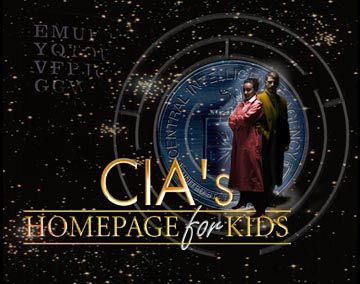
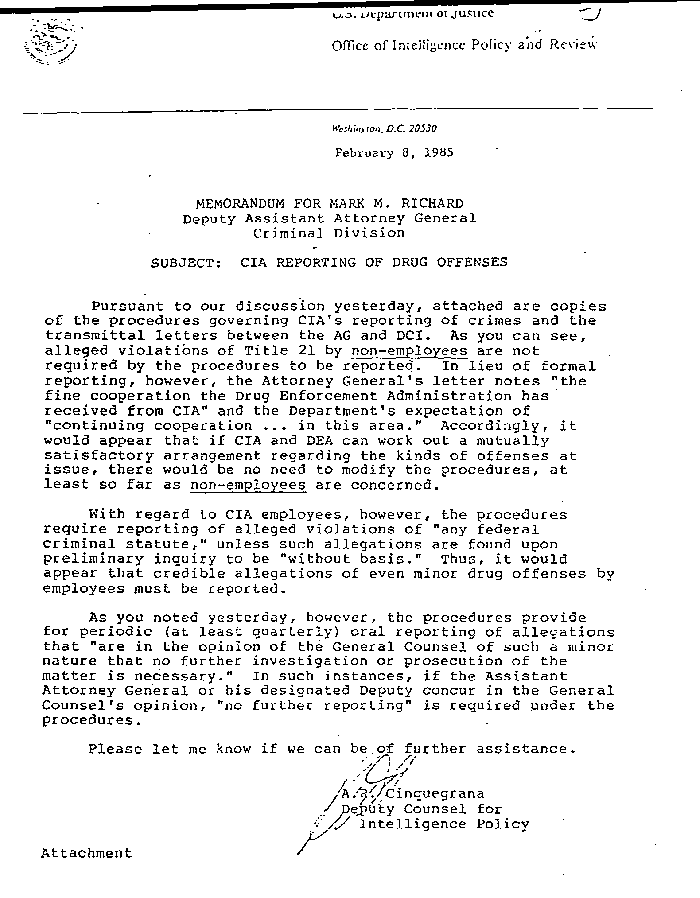
Directors of Central Intelligence (DCI)
- Rear Adm. Sidney W. Souers
- Lt. Gen. Hoyt S. Vandenberg
- Rear Adm. Roscoe Hillenkoetter
- Gen. Walter Bedell Smith
- Allen Dulles
- John McCone
- Vice Adm. William Raborn, Jr.
- Richard Helms
- James R. Schlesinger
- William Colby
- George HW Bush
- Adm. Stansfield Turner
- William Casey
- William Webster
- Robert Gates
- R. James Woolsey
- John Deutch
- George Tenet
Timeline
| 13 Apr 1953 |
CIA commences MKULTRA, at the instigation of Richard Helms. |
| 5 May 1955 |
An internal CIA memo emphasizes the need for a drug that creates a state of "pure euphoria" and no letdown. From this springs Operation Midnight Climax, in which CIA brothels were set up in San Francisco, and their customers surreptitiously dosed with LSD by prostitutes. Operative George Hunter White observed reactions behind a two way mirror, purely in the interest of science. |
| 1966 |
Nixon appoints Richard Helms as DCI, the first careerist to hold that position. |
| 9 Oct 1967 |
After being debriefed by CIA field agent Felix Rodriguez, Che Guevara is executed in a schoolhouse in La Higuera, Bolivia. Guevara had been captured by the Bolivian 2nd Ranger Battalion, which was specifically trained by U.S. Army Special Forces to catch him. |
| 2 Feb 1973 |
Richard M. Nixon fires Richard Helms and replaces him with William Colby. |
| 21 Jul 1975 |
President Gerald Ford publicly apologizes for the death of Dr. Frank Olson, who died in 1953 after unwittingly getting dosed with LSD by the Central Intelligence Agency. |
| 2 Nov 1975 |
President Gerald Ford fires CIA Director William Colby and replaces him with George HW Bush. |
| 1977 |
Former CIA Director Richard Helms pleads guilty to perjury, for lying to Congress. In February 1973, he had told the Senate Foreign Relations Committee under oath that the CIA had never attempted to overthrow the government of Chile. Helms receives a $2,000 fine and a two-year suspended sentence. |
| 1983 |
President Ronald Reagan honors former CIA Director Richard Helms with the National Security Medal. Regarding his 1977 felony conviction for lying to Congress, Helms remarks: "I have no feelings about remorse or exoneration." |
| 17 Oct 1984 |
The New York Times runs an article entitled "CIA Primer Tells Nicaraguan Rebels How to Kill." The story describes the secret manual Psychological Operations in Guerrilla Warfare which the CIA furnished to the Contras in Nicaragua. The booklet instructed how to kidnap and assassinate civil officials, such as judges and police. |
| 1996 |
"A safe estimate is that several hundred times every day (easily 100,000 times a year) [Directorate of Operations] officers engage in highly illegal activities (according to foreign law) that not only risk political embarrassment to the US but also endanger the freedom if not lives of the participating foreign nationals and, more than occasionally, of the clandestine officer himself. In other words, a typical 28 year old, GS-11 case officer has numerous opportunities every week, by poor tradecraft or inattention, to embarrass his country and President and to get agents imprisoned or executed." -from IC21: The Intelligence Community in the 21st Century, a staff study produced by the Permanent Select Committee on Intelligence. |
| 26 Apr 1999 |
Former President George HW Bush: "I have nothing but contempt and anger for those who betray the trust by exposing the names of our [intelligence] sources. They are, in my view, the most insidious of traitors." |
| 7 Oct 2003 |
President George W Bush, regarding the leak of CIA operative Valerie Plame's identity to Robert Novak: "I don't know if we're going to find out the senior administration official. I don't have any idea." |
| 24 Oct 2003 |
On his television show The O'Reilly Factor, Bill O'Reilly declares: "It looks like President Bush, President Clinton before him, and other powerful Congresspeople were simply given erroneous information by the CIA and other intelligence outlets. We need to know why that happened. George Tenet should get a full hearing. But if his explanations aren't compelling, he should be asked to resign... We need to know exactly why the Iraq situation is so screwed up." |
| 3 Jun 2004 |
President George W Bush makes an impromptu appearance on the White House lawn to announce George Tenet would be resigning as head of the CIA: "I met with George last night in the White House. I had a good visit with him. He told me he was resigning for personal reasons. I told him I'm sorry he's leaving. He's done a superb job on behalf of the American people." |
|
 Never have so many done so much that was so bad to so many others for so little discernible benefit to so few.
Never have so many done so much that was so bad to so many others for so little discernible benefit to so few. 
 Iran was representative of the CIA's seeming inability to comprehend the Islamic and Middle Eastern mindsets, resulting in countless examples of "blowback," the agency's term for covert operations in which U.S.-supported operatives subsequently turn against their sponsors.
Iran was representative of the CIA's seeming inability to comprehend the Islamic and Middle Eastern mindsets, resulting in countless examples of "blowback," the agency's term for covert operations in which U.S.-supported operatives subsequently turn against their sponsors.  The looming threat of Communism fueled huge increases in CIA staff and budget through out the next two decades. The mission and ambition of the CIA also grew during this period. Intelligence-gathering is all well and good, but it lacks the joie de vivre of a needlessly elaborate covert action to accomplish a morally ambiguous goal. Under Dulles, and continuing through the present day, the CIA took on the jobs nobody else could... or would... or should...
The looming threat of Communism fueled huge increases in CIA staff and budget through out the next two decades. The mission and ambition of the CIA also grew during this period. Intelligence-gathering is all well and good, but it lacks the joie de vivre of a needlessly elaborate covert action to accomplish a morally ambiguous goal. Under Dulles, and continuing through the present day, the CIA took on the jobs nobody else could... or would... or should... 
 Around the same time,
Around the same time, 

